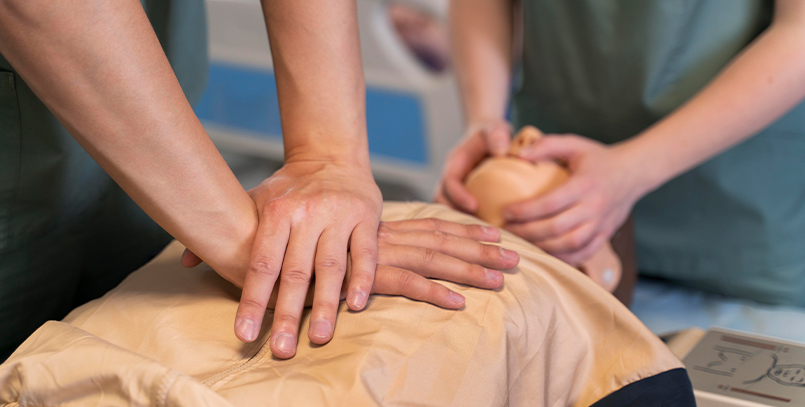Knowing how to perform cardiopulmonary resuscitation (CPR) and use an automated external defibrillator (AED) can mean the difference between life and death for someone experiencing sudden cardiac arrest. As the largest city in Manitoba, Winnipeg sees its fair share of heart-related medical emergencies. Equipping more citizens with crucial AED and CPR Training Winnipeg builds a lifeline that runs through our neighborhoods, workplaces, and public venues.
Sudden Cardiac Arrest: A Leading Cause of Death
Sudden cardiac arrest stems from an electrical malfunction that throws the heart into an abnormal rhythm. Called ventricular tachycardia or ventricular fibrillation, this erratic heartbeat causes blood flow to abruptly halt. The sooner an AED shock can restore normal rhythm, the better one’s chances of survival before irreversible brain damage sets in. Sadly, the American Heart Association estimates that only 11% of cardiac arrest victims outside hospitals receive help from bystanders before emergency responders arrive. CPR Training Winnipeg for community members remains low nationwide, leading to preventable deaths across all age groups.
The Benefits of Widespread AED Knowledge
While no substitute for medical care, an AED paired with high-quality CPR works wonders for stabilizing sudden cardiac arrest. These lightweight, portable devices feature easy-to-follow voice prompts that guide even untrained users through the process of saving a life. Delivering a targeted electric current, the AED can reboot the heart’s pumping capacity when deployed within the first few minutes. Survival odds rapidly diminish beyond that narrow window unless circulation gets restored. Winnipeg residents who routinely encounter large groups of people receive priority for AED and CPR Training in Winnipeg.
Who Can Benefit Most from Training Sessions
Coaches, fitness center staff, lifeguards, educators, caregivers, security workers, and faith community members comprise some of the civic-minded professionals well-positioned for picking up AED and CPR Training in Winnipeg. Because sudden cardiac arrest spares no ethnic group or age category, universal training allows more Winnipeg residents to step in when someone collapses in distress. Building competency around AED use and chest compressions empowers people to provide bridging assistance until emergency medical teams rush to the scene. Standard CPR/AED certification lasts two years before requiring a renewal course.
Saving Lives in Winnipeg’s Schools
From elementary schools to universities, academic settings bustle with youth who can fall victim to sudden cardiac arrest linked to underlying heart conditions. Thankfully, AED legislation passed in Manitoba 13 years ago mandated these devices in all schools along with staff members trained in their usage. Some Winnipeg districts have gone beyond the minimum requirements by holding CPR Courses Winnipeg to certify as many teachers, administrators, and coaches as possible. When survival counts on rapid response, arming dozens of potential bystanders around students makes sense.
Offices, Gyms, and Public Venues
Winnipeg workplaces with over 50 employees on site must comply with laws to install at least one AED for employee and visitor protections. Fitness centers and recreational facilities in the city typically house the lifesaving devices as well. Although using an AED Training Winnipeg seems intimidating for those lacking confidence in their skills, listening carefully to the equipment’s clear instructions helps everyone follow the right steps. Setting up refresher trainings in the break room or company retreats enables more staff members to sharpen their readiness. From shopping malls to event centers that draw crowds, having an AED available brings comfort.
Grassroots Programs Expanding Access
Winnipeg counts over 800 AEDs registered through AED Manitoba as more organizations see value in participating. This charitable group collaborates closely with the Heart and Stroke Foundation while pursuing an ambitious goal to spread defibrillators across Winnipeg. Thanks to their efforts, AEDs now reside in settings like Royal Canadian Legion branches, community centers, places of worship, and Aboriginal health centers. Removing financial barriers that could deter sponsors, AED Manitoba offers subsidized CPR Training Winnipeg for qualifying groups. Every batch of residents obtaining certification gets the city closer to blanket protection against sudden cardiac arrest.
Where Hands-Only CPR Can Help
For bystanders hesitant to perform mouth-to-mouth rescue breathing during CPR, focusing on continuous chest compressions works better than doing nothing. Taught across Winnipeg as “Hands-Only CPR,” this simplified technique aligns with the latest medical advice for cardiac arrest response. Students as young as middle school can quickly master the two-step process that involves calling emergency services and using rapid, forceful movements to mimic the heart’s pumping action. Across Winnipeg, Hands-Only CPR gets promoted through 60-second instructional videos and practical demonstrations at public gatherings. Thanks to simplified AED Training Winnipeg, more Winnipeg residents feel empowered to aid in a crisis.
The Power to Save Lives Rests in Our Hands
No one expects to witness a coworker, student, visitor, or stranger collapse without warning from sudden cardiac arrest. However, sound preparedness across Winnipeg workplaces, campuses, and community hubs mitigates the damage caused by such terrifying events. Expanding AED and CPR Training Winnipeg guides us through emotional chaos with clear directives that restore breathing and heartbeat until emergency teams take charge. In a remarkable display of commitment to each other’s welfare, Winnipeg civic leaders, employers, school officials and grassroots advocates continue advancing these lifesaving skills across our population.

 Cardiac arrest can happen anytime, anywhere. Being prepared with lifesaving skills like automated external defibrillator (AED) use and cardiopulmonary resuscitation (CPR) can make the difference between life and death for someone experiencing sudden cardiac arrest. Winnipeg offers numerous options for comprehensive AED and
Cardiac arrest can happen anytime, anywhere. Being prepared with lifesaving skills like automated external defibrillator (AED) use and cardiopulmonary resuscitation (CPR) can make the difference between life and death for someone experiencing sudden cardiac arrest. Winnipeg offers numerous options for comprehensive AED and 

